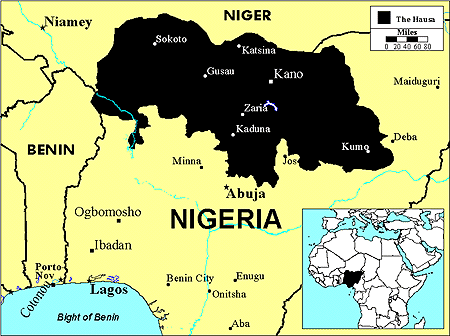All You Need To Know About Hausa
By Sarah-Claire Jordan
 Hausa is a language in the Chadic family that is spoken primarily by the Hausa ethnic group. This group happens to be one of the largest ethnic groups in Africa, so you can imagine how many people speak it as a native language. Native speakers mostly live in the north of Nigeria, Chad, and Niger. It’s spoken in other parts as well, specifically the Sahel zone of Africa which stretches from the Atlantic Ocean to the Red Sea between the Sahara and the Sudanian Savanna.
Hausa is a language in the Chadic family that is spoken primarily by the Hausa ethnic group. This group happens to be one of the largest ethnic groups in Africa, so you can imagine how many people speak it as a native language. Native speakers mostly live in the north of Nigeria, Chad, and Niger. It’s spoken in other parts as well, specifically the Sahel zone of Africa which stretches from the Atlantic Ocean to the Red Sea between the Sahara and the Sudanian Savanna.
Like many African languages, we don’t tend to learn much about Hausa and the people who speak it. To enlighten you a bit, here are three important facts about the Hausa language that will give you a better understanding of it:
- It is a popular second language
As a lingua franca, Hausa is used by traders in many parts of West and Central Africa as well as the Sahel zone. You can find it spoken in Togo, Cameroon, Benin, Ghana, and other countries outside of the zone where it is spoken natively. On top of that, it is a popular subject to study at universities in Africa and also in other countries. Since most people who speak Hausa are Muslims, whether they identify as Hausa or not, it has also become a lingua franca for Muslims from different parts of Africa to use to communicate with each other.
- It has many different dialects
Given that the regions you can find it spoken in are pretty widespread, it doesn’t seem so odd that different dialects of Hausa would develop. Hausa dialects can be broken down into about three different groups: traditional dialects, northern dialects, and the dialect spoken in Ghana and nearby areas. There are a few other dialects as well, but they aren’t as common. Northern dialects of Hausa are different from the traditional dialects in terms of grammar and tonality. Since there is a lot of interaction between Hausa speakers and Tuareg and Zarma groups in the north, some grammar changes have occurred. This exposure has also meant the loss of tonality that traditional dialects have, which in northern dialects has been modified to a pitch accent.
- A few writing systems are used to write in Hausa
Though the official writing system for Hausa is called boko and is based on the Latin writing system, it’s not the only option. It is an imposed system, thanks to the British colonists, and there was already a system being used before they arrived. This system is an Arabic system called ajami and has been used since the 1600s. However, the system isn’t standardized, so it is up to the writer which values they want to give the letters. As well as those writing systems, there are a few other writing systems that have been proposed but never became very popular at all. Hausa is also one of three native languages in Nigeria to have its own Braille writing system.
For an overview of our translation expertise, visit our medical and life science translation page.
Category: Foreign Language








